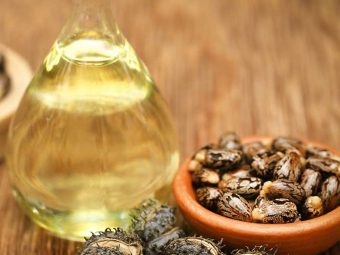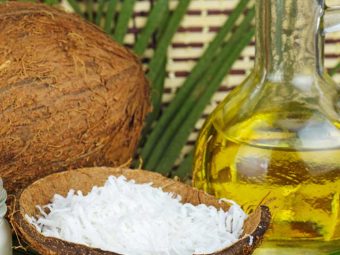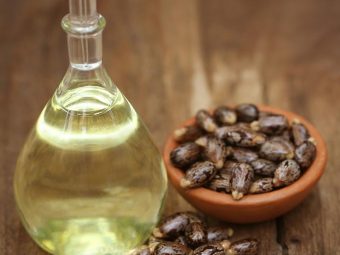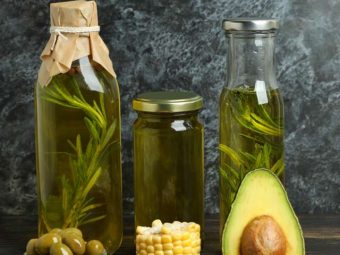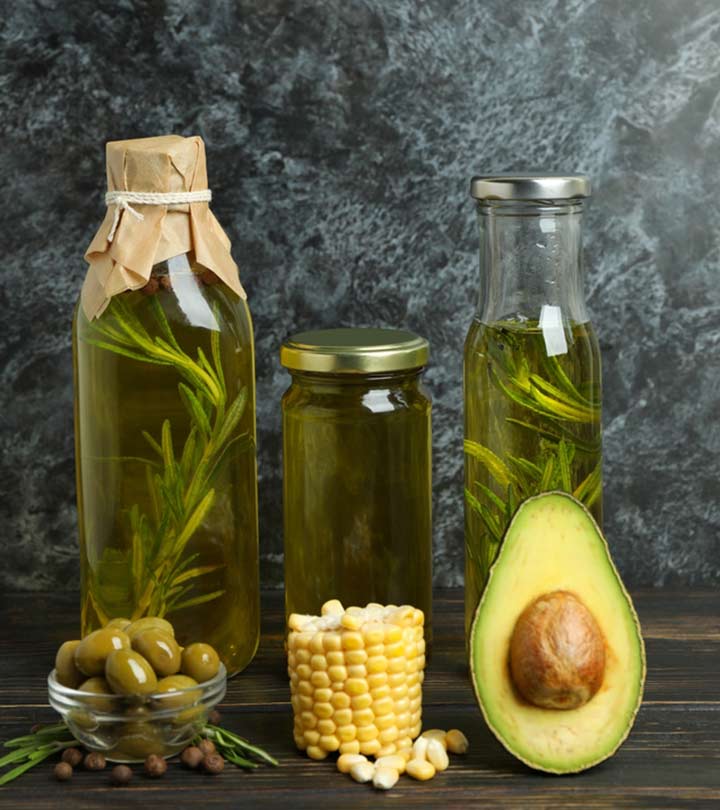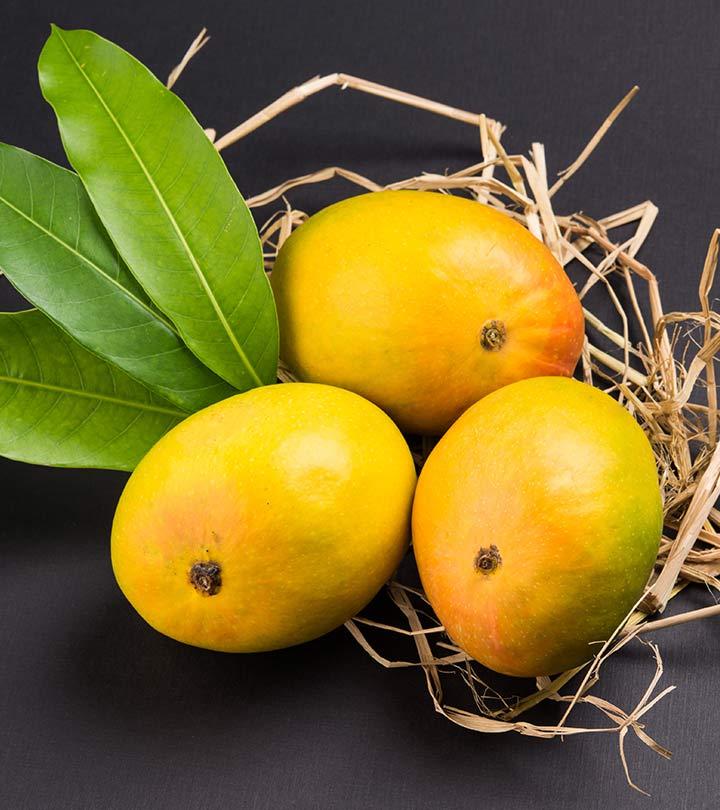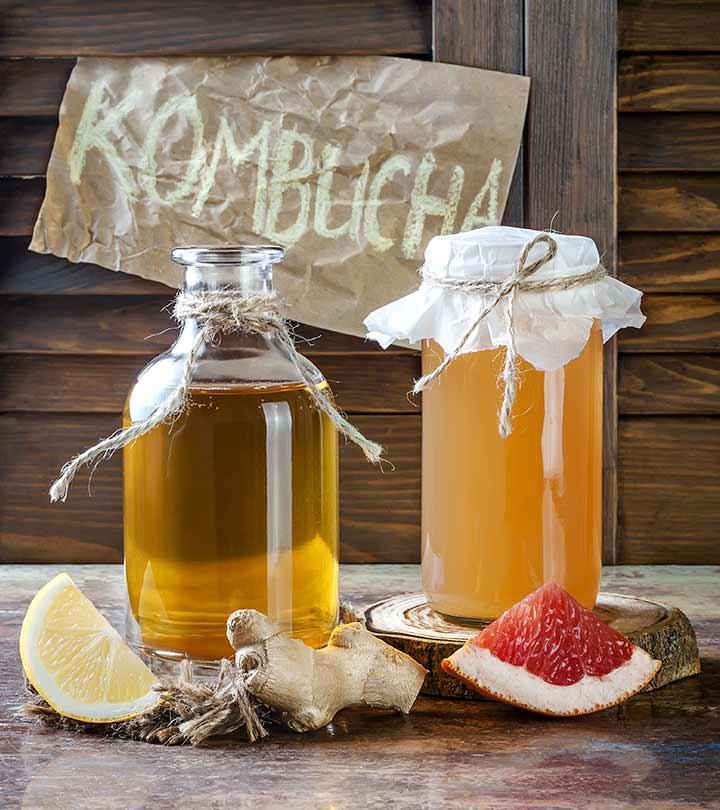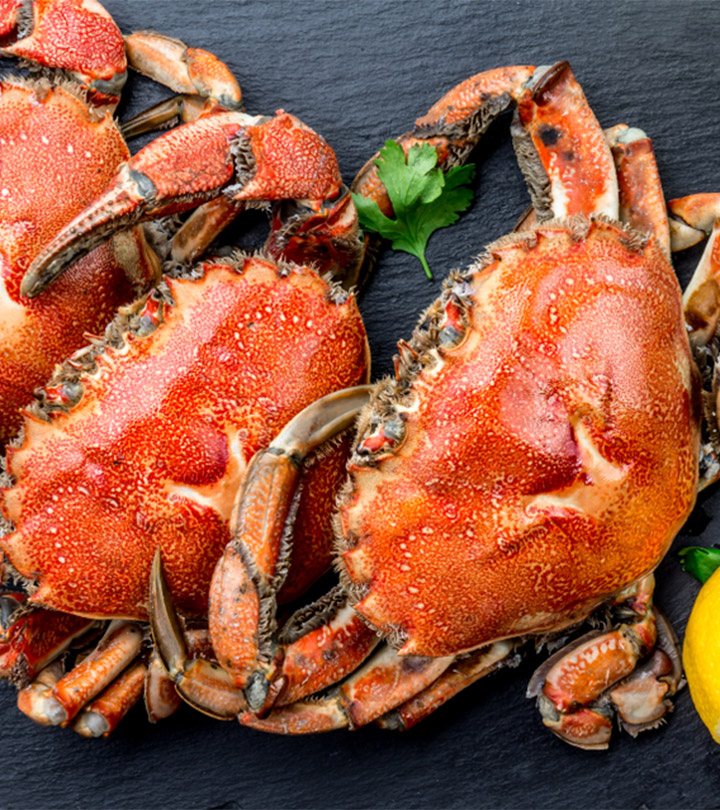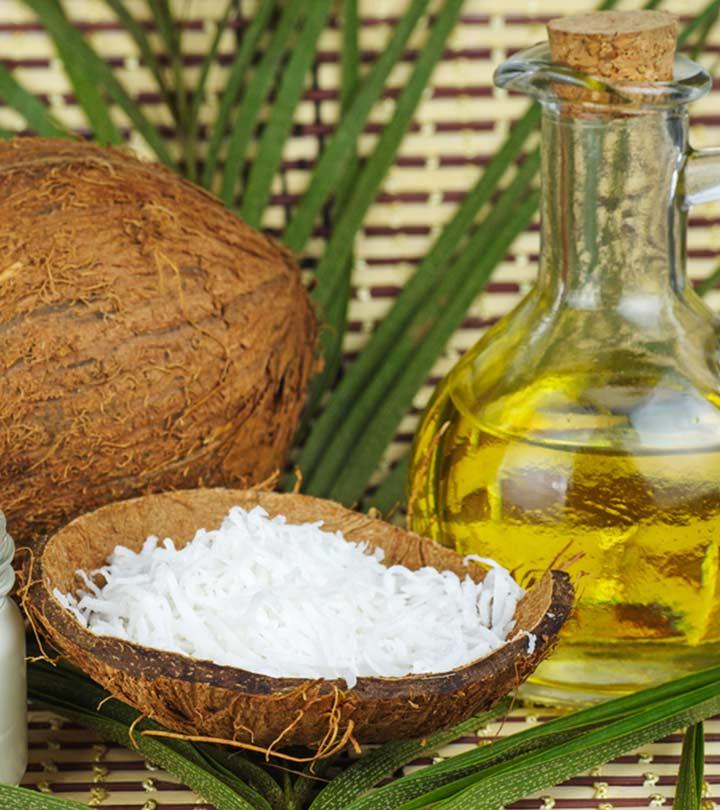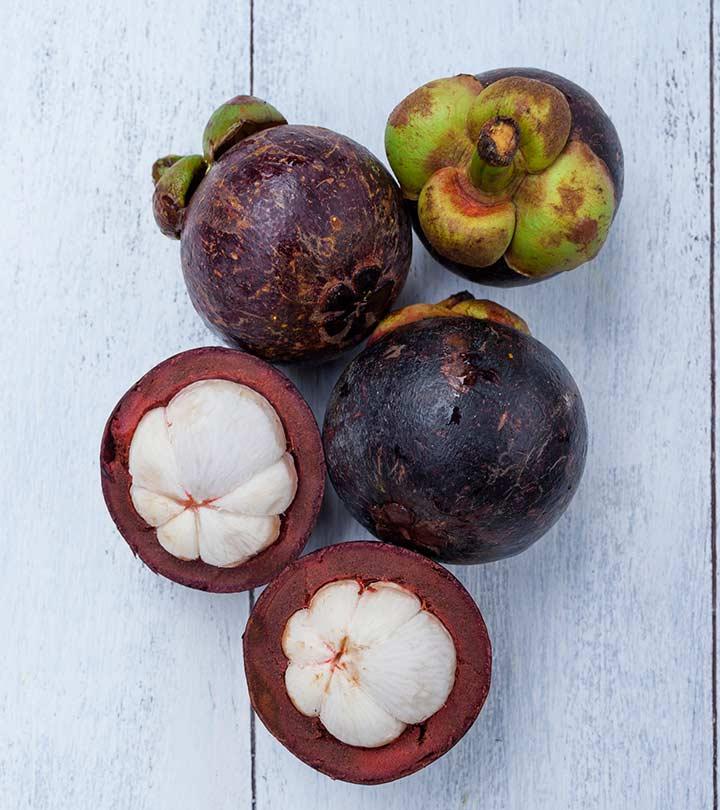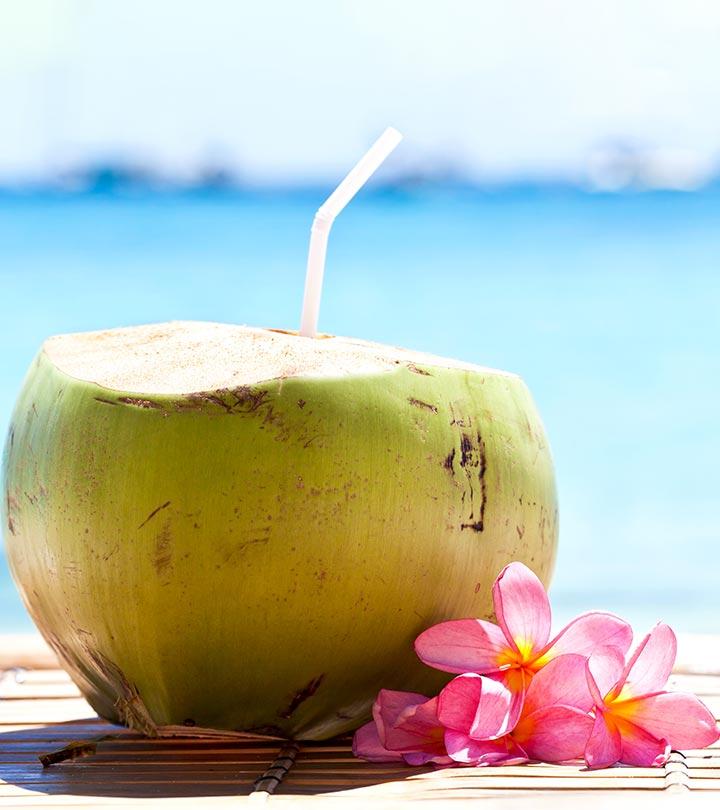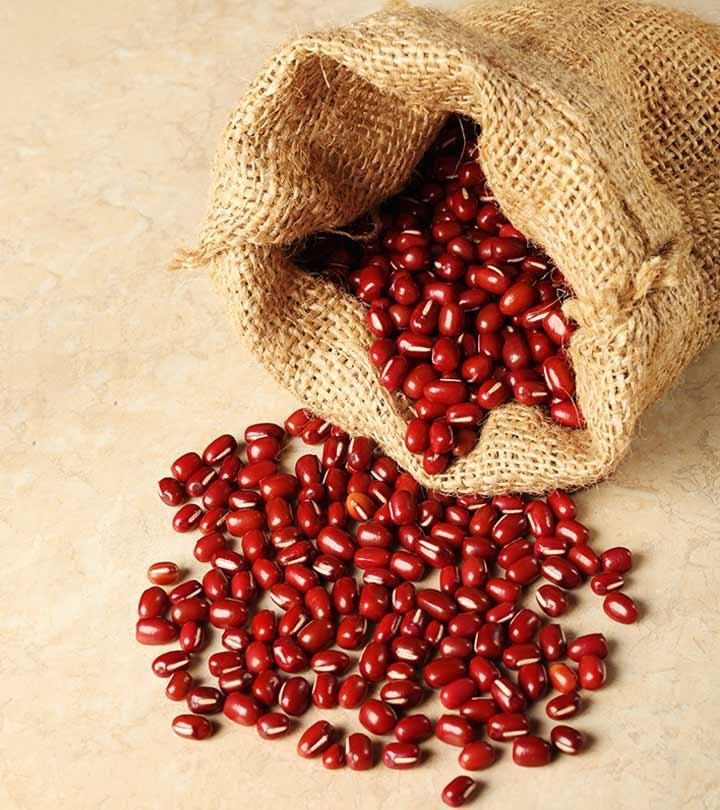What Are The Differences Between Castor Oil And Coconut Oil?
Understanding the difference is the first step to picking the right oil for your hair!
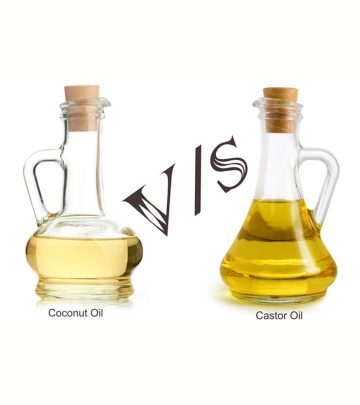
Image: StyleCraze
When it comes to health-nourishing and skin-benefitting oils, there are a few which set the benchmark! While each have their own benefits and usage, sometimes it is hard to decide. For instance, castor oil vs. coconut oil – do you have a preference when it comes to these oils? Do you know what their unique properties are? Depending on your skin type and concerns, you may most likely choose one over the other. But for that you need to be aware of their similarities and differences! Whether you can substitute one for the other or if you can blend and use them together, you must be eager to know. For all the answers and more about how castor oil vs. coconut oil fare against each other, read on!
In This Article
Castor Oil vs Coconut Oil
So what are the effects of coconut oil vs castor oil? Read to find out!
Castor Oil Properties
Being thick in consistency, castor oil is often misinterpreted for its skin and hair benefits. But to our utter surprise, it is a wonderful natural remedy that promotes thickening and hair growth. In fact, not only for the scalp, it can even be used for the eyebrows and eyelashes to make them thick, long and luscious in an easy and quick manner. Here is how this happens:
- Antibacterial And Antifungal: Castor oil, produced from castor beans has high amounts of ricinoleic acid, due to which it is highly anti-bacterial, anti-inflammatory, and anti-fungal in nature. Hence, it attacks the bacteria and fungus that dwell in the roots of the hair and prevent them from growing.
- Thickness In Nature: The thickness of castor oil is also an advantage as it prevents the hair from falling by coating it nicely and helping it stay firmly on its roots.
- Rich In Omega 9 Fatty Acids: Castor oil is rich in omega 9 fatty acids and triglycerides, that proves to be a source of nourishment for the hair, hair follicles, and the skin alike. It can penetrate deep into the skin and act as a skin moisturizer and also nourish the roots of the hair finely and makes them stronger.
- Makes Hair Glossy And Shiny: Another benefit of castor oil for hair is that it makes the hair glossy and shiny. Also, when regularly applied, it can help one have smooth hair that is easily manageable and strong and acts as a natural hair conditioner!
- Cost-friendly: Castor oil is required to be used sparingly because even a little amount of it is very thick and can spread on quite a major part of the scalp. Hence, it also proves to be quite cost-friendly, given its usage and the pricing that it has on the market.
 Trivia
TriviaWith all these traits, castor oil is indeed the dream oil for all those who would like to regain their lost hair or make their hair stronger! However, coconut oil is also a viable option in this context; here’s how:
Coconut Oil Properties
If castor oil is for treating hair for issues like hair fall, and hair loss, coconut oil is that one oil that you would like to add to your regular hair care regime. The oil has properties with which it protects the hair from environmental conditions and also keeps it moisturized for long. With this, it also helps in growing the hair longer and stronger in a convenient manner.
- Prevents Head Lice, Hair Shedding: Coconut oil is quite helpful in treating and preventing dandruff as it has anti-fungal, anti-viral and anti-bacterial properties. At the same time, it also prevents issues like head lice and hair shedding as it contains vitamins E and K in considerable amounts (1).
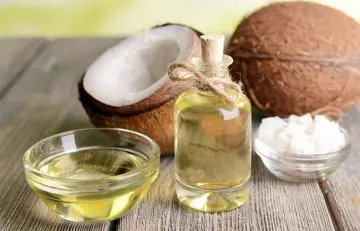
- Improves The Strength Of The Hair: Regular massage with coconut oil improves the hair cuticle health and strengthens the hair follicles, thus improving the strength of the hair. Alongside, massaging the hair with this oil keeps the hair and scalp moisturized and thus protects them from dust and environmental pollution.
Candra, a hair blogger, shared her experience of using coconut oil for her. She said, “I did my first coconut oil hair treatment in the summer of 2014. Within three months my hair grew to its longest length. It was incredibly soft and I experienced very little breakage (i).”
- Prevents Hair Breakage & Hair Fall: Coconut oil is rich in lauric acid, capric acid, medium-chain triglycerides, and quite a few essential fatty acids that supply proteins to the hair and thus help in retaining their strength and prevent them from breakage and falling off.
- Makes Hair Strong & Healthy: Massaging with coconut oil also boosts the circulation of blood in the scalp and ensures a healthy supply of oxygen to the hair, thus making it stronger, softer, and healthier. Issues like split ends, hair breakage, rough/frizzy hair are also addressed by the use of coconut oil on a regular basis. You can also make a hair mask from coconut water and coconut meat to hydrate frizzy hair.
There are different types of coconut oils that offer specific benefits to improve your health. Read about them below.
Types Of Coconut Oils
Coconut oil comes in several types, each offering distinct benefits.
- Virgin coconut oil is extracted from fresh coconut meat without any chemical processing. Thus, it retains its rich aroma and flavor. It is popular in culinary applications and as a moisturizer due to its high content of antioxidants and fatty acids.
- On the other hand, refined coconut oil undergoes a refining process that removes its coconut scent and flavor. This oil is ideal for cooking at higher temperatures and is often used in baking and frying.
- Additionally, there is a third type called the fractionated coconut oil. It is a clear, odorless liquid primarily used in skin care and massage oils for its long shelf life and ability to blend well with essential oils.
 Quick Tip
Quick Tip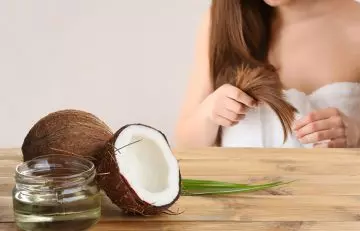
How To Use Castor Oil For Hair Loss?
Ingredients
1/2 cup castor oil
What You Need To Do
- Put some castor oil in your hand and run it through your hair from root to tip (the same way you apply regular oil). Massage thoroughly.
- Allow the oil to sit for at least 15-20 minutes. You might even leave it on all night.
- To remove the oil, you will need to shampoo several times.
- After washing it, gently towel-dry your hair. Avoid using any heat styling tools right away.
How To Use Coconut Oil For Hair Loss?
Ingredients
1/2 cup coconut oil
What You Need To Do
- Scoop half cup coconut oil into a bowl.
- Heat it for 5-7 seconds. Avoid overheating.
- Give it a moment to cool.
- Put a small amount of coconut oil on your fingers and massage it over your scalp.
- Partition your hair so that each strand receives nourishment.
- Apply coconut oil to your hair, working it in from the tips to the roots.
- Allow the oil to sit for at least 15-20 minutes. You might even leave it on all night.
- To remove the oil, you will need to shampoo several times.
- After washing it, gently towel-dry your hair.
Infographic: Important Properties Of Castor Oil And Coconut Oil
Coconut oil and castor oil have different properties and benefits. They are excellent for your hair and can help keep it healthy in many ways. Check out the infographic below to learn the major properties of these two oils and how they may keep your hair and scalp healthy. Illustration: StyleCraze Design Team
Hope you liked our post on castor oil vs coconut oil. The above analysis proves that both castor oil and coconut oil are wondrous products for hair care. However, the choice that you make among these depends on the kind of issue that you would like to address. If it’s hair loss and hair regain, then go in for castor oil and if it is regular hair maintenance that we are talking about, then coconut oil should be your pick!
Frequently Asked Questions
Is it good to mix castor oil with coconut oil?
Yes. Both oils work well when blended in equal proportions.
Can you apply castor oil to your hair every day?
No. Anecdotal evidence suggests that you limit yourself to using the oil on your hair just once or twice in a week to prevent oil build-up
Does castor oil act as a laxative?
Yes, anecdotal evidence suggests that castor oil is a natural emollient that may help in treating occasional constipation.
Which oil is better for treating acne: castor oil or coconut oil?
Both castor oil and coconut oil may help manage acne. Coconut oil and castor oil contain lauric acid and ricinoleic acid respectively. These acids have strong anti-inflammatory properties that may keep acne breakouts in check.
Is castor oil or coconut oil better for eyelash growth?
Both oils have high fatty acid content that can moisturize your lashes, keep them healthy, and may even promote lash growth.
Can castor oil or coconut oil be used as a carrier oil for essential oils, and which one works better?
Both oils are carrier oils and can be used to dilute essential oils. Coconut oil is a little lighter and might be more suitable for oily or combination skin types, while castor oil is heavier and better suited for dry skin types.
How do castor oil and coconut oil compare in terms of their texture and consistency?
Castor oil is thicker in consistency and highly viscous in texture as compared to coconut oil, which is a thin and clear liquid with non-sticky consistency.
Key Takeaways
- Castor oil boosts hair thickness and regrowth, while coconut oil prevents hair lice and hair fall.
- Castor oil contains ricinoleic acid that has antibacterial and antifungal properties to prevent infections.
- The omega-3 fatty acids in castor oil nourish hair follicles, strands, and the scalp.
- Coconut oil protects the hair from environmental damage and keeps its moisturized.
- Coconut oil strengthens hair follicles to prevent breakage and promote hair cuticle health.
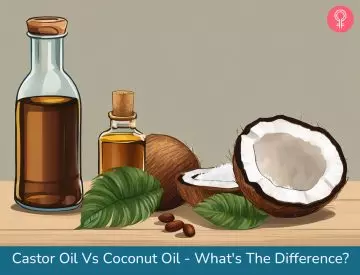
Image: Stable Diffusion/StyleCraze Design Team
Unleash the power of coconut oil and castor oil for luxurious hair growth. Explore the secrets of these natural wonders and learn how to achieve luscious locks by watching this video.
Personal Experience: Source
StyleCraze's articles are interwoven with authentic personal narratives that provide depth and resonance to our content. Below are the sources of the personal accounts referenced in this article.
i. Coconut Oil Hair Treatmenthttps://abundantlyyou.wordpress.com/tag/coconut-oil-hair-treatment/
References
Articles on StyleCraze are backed by verified information from peer-reviewed and academic research papers, reputed organizations, research institutions, and medical associations to ensure accuracy and relevance. Read our editorial policy to learn more.
- The in vivo pediculicidal efficacy of a natural remedy
https://pubmed.ncbi.nlm.nih.gov/12389342/









